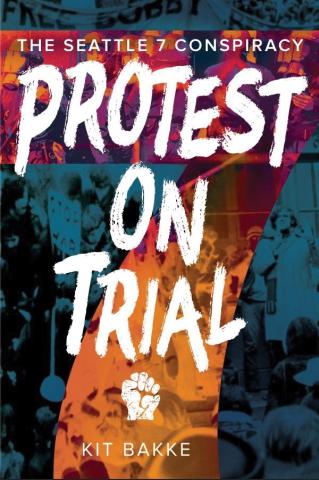More American than Apple Pie
Revisiting a long-ago trial, an alumna sheds light on the American way of dissent.
A product of 1960s counterculture, the Seattle 7 were young and idealistic. In the wake of a protest turned violent, they were indicted for conspiracy to incite riot. The ensuing trial mirrored that era’s politicized climate. Telling their story through interviews with the defendants, attorneys, FBI agents, and others, Kit Bakke ’68 reveals what happened when the Seattle 7 had their day in court and what it says about dissent in America. Here is an excerpt from her 2018 book, Protest on Trial, published by Washington State University Press.
Effective American dissent is a multi-step process of observation, thought, and action. It may not always be a conscious process, but dissenters first recognize a problem, weigh how much they care about it, and consider its significance, both personally and to the wider community. Depending on their conclusions, they might move on to action.
Dissent is practiced in many ways: individual acts of civil disobedience, street marches, protests and demonstrations, boycotts and petitions, street theatre, strikes, physical occupations, civil suits and electoral activity. Individuals enter and leave the fray as their energy, understanding, resources and competing commitments wax and wane. Individuals coalesce into groups and organizations which sometimes collapse under factional infighting and sometimes grow into large united fronts.
Most dissenters, though, are more like the Seattle 7. They are not movie heroes or villains. They are always a minority of the population. They are individuals with their own energy levels and their own sense of patriotism. Their timing might be ill-advised, they may misjudge the strength and rootedness of the problem they wish to fix, and they may have only a partial grasp on the consequences of their actions. Still, they choose to step beyond a life of family, home, and career in order to engage with others in some of our world’s greatest challenges. Dissent is risky, because as one activist put it, “when you expose a problem you pose a problem.”
The underlying belief common to the Seattle 7 and most dissenters is that human society should trend over time toward greater freedom for its members and greater safety for its communities. Dissenters have a profound discomfort with not trying to live according to their principles or seeing their country failing to do the same. They feel a need to personally respond, no matter how small the act may be, to express those principles and ameliorate those failures. ...
The Seattle 7 believed that a good society holds itself together by recognizing people’s common need for food, shelter, safety, personal affection, and meaningful activity, now and for future generations. That is, of course, the American dream. We live today neither in the worst of times or places, nor in the best of times or places. Much is left to be done; our relatively greater freedom to dissent comes with greater responsibilities to exercise that right. The problems out there to be solved today are surely as great as they were in 1970. The tools available today are more numerous, and the opportunities for creative engagement are broader as well. Dynamic, thoughtfully focused dissent is even more American than apple pie, and is both the foundation and the scaffolding of a more just and free future.
Published on: 03/19/2018
